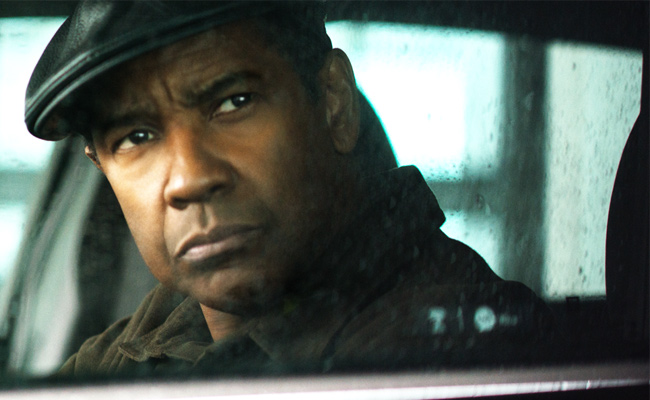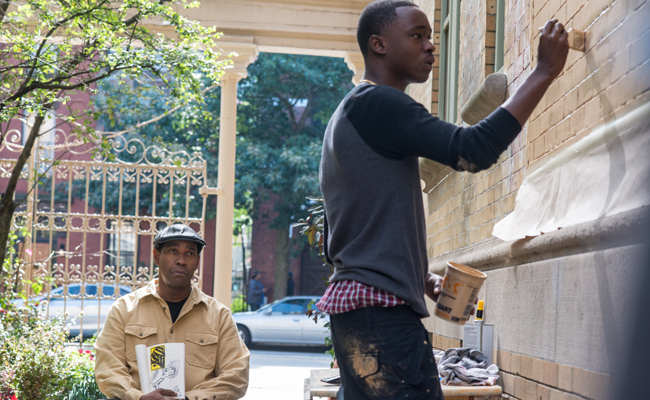
There’s a moment during The Equalizer 2 in which Denzel Washington, as homicidal yet caring former Army man Robert McCall, is meticulously scrubbing graffiti off the inner wall of his apartment courtyard. His adolescent neighbor, Miles (Ashton Sanders), walks by, casually inquiring why a tenant like McCall would go to all the trouble of scrubbing off graffiti rather than just let the landlord handle it. McCall gives him some speech about how sure, he could wait for the landlord to handle it and walk by it like everybody else, but he’d rather just do it because he can, and everything would be better if everyone just pitched in to do the things that should be done when they know they could do them.
It’s a speech that’s clearly meant to express a lot about McCall as a character, and what motivates him in his life as a vigilante. He’s a guy who’s very passionate about “cleaning up the community,” so to speak (subtle metaphor alert). However, all I could pay attention to the entire scene was the fact that the only legible section of the graffiti he was cleaning up read “GANG.”
That’s right, a gang member apparently broke into this random apartment complex, and, as gang members are wont, spray painted the word “GANG” on the wall. For me, this scene was a microcosm of the entire Equalizer 2 experience. Which is to say, acceptably silly for a bit and then one step too far for no good reason.
Whenever I write something critical of a movie like this, someone always jumps in to ask, “Yeah, well what did you expect?”
In this case, the answer is that I expected a sort of dumb action movie about Denzel Washington killing lots of people. I expected to suspend certain kinds of disbelief, like, say, deferring my preconceived notions about the prevalence of innocent young girls getting kidnapped in the vicinity of Denzel Washington. Or setting aside my previously-held ideas about the ability of a 63-year-old man to disarm and murder multiple gun-wielding assailants (and to be sure, Denzel does not look like a 63-year-old). What I didn’t expect was to have to pretend to believe that gang members are running around town trashing apartment complex gardens and spray painting “GANG” on things. That feels like a bridge too far. In fact it kinds of reminds me of the Mississippi man who claimed some vandals spray-painted “BLACKS RULE” on his driveway. Only in this case, there was no hint that it was an attempt at a false flag.

Throughout, director Antoine Fuqua, who’s probably most famous for directing Training Day, possibly my favorite LA cop movie, has a flair for gritty, realistic violence, that, when paired with this TV-movie script about a kindly neighborhood man who goes around killing cartoon bad guys, just seems kind of tacky. We’re treated to closeups of gouged out eyes and disemboweled guts, and — my favorite — the blood and brain matter spraying onto framed family photos. This is interspersed with McCall delivering long exhortations about hard work and bootstrapping to young Miles, who might as well have “IMPRESSIONABLE YOUTH” tattooed across his forehead, GANG-style.
And that’s before the literary references. In one scene, McCall promises Miles $115 bucks to paint his wall, but only if Miles agrees to read Ta-Nahisi Coates’ Between The World And Me. McCall actually makes Miles read the author’s name out loud. Also, I’m not sure what Ta-Nahisi Coates or Richard Wright (also referenced by McCall) have to do with a B-movie vigilante.
The Equalizer 2 is weirdly preachy. Whereas the heroes of these kinds of semi-retired vigilante movies are usually the strong, silent type, McCall is more like a grandstanding football coach, the kind of guy you can easily imagine shouting, “If we can’t score running it up the gut, we don’t deserve to score at all!” at a group of 10th graders. It gives his tough-guy pronouncements less weight when he’s preaching all the time.
Likewise, Miles is a promising artist (because of course) trying to avoid the pitfalls of gang life, with McCall exhorting him to “stay off those corners.” But when Miles tries to ask McCall what seems like the very valid question of how he’s supposed to make a living in the meantime before he becomes a famous artist, McCall essentially just grabs him by the collar to scream that Miles is a pansy who’s never seen death the way McCall, the Army man has.
If the movie had been consciously setting up McCall as a kind of obnoxious guy who will murder your enemies so long as you pretend to listen to all his speeches about eating your vegetables and not cursing, it would’ve made for an interesting new kind of movie hero. Instead, it tries to associate him with Ta Nahisi Coates and Richard Wright, without referencing either of their actual ideas, when in reality McCall’s shtick sounds more like Bill Cosby or Hulk Hogan. Stop it with the filth flarn filth! And take your vitamins! We know how that movie ends.
In the final act, McCall, in as transparent a way possible, triumphs over moral relativism. Which he does, of course, by brutally murdering it in graphically-filmed gore. In the past, this kind of character, who abhors swear words but kills with obvious relish, would’ve been positioned as an interesting contradiction. In The Equalizer 2, you never get the sense that it’s supposed to be contradictory. It just feels like unexamined orthodoxy. It feels like the symptom of a very American kind of brain sickness.






